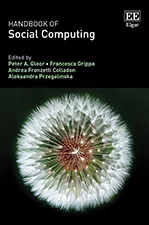Emerging research reveals the blurred lines between humans and technology
Using cutting-edge data and analysis, this new book shares the impact of our rapidly growing digitized society.

- Jazz musicians have slower heart-rates when they are “in the flow.”
- In social channels, climate change deniers tend to focus on negative communication, whereas believers skew towards more positive language.
- Entrepreneurial success is significantly reduced when we excessively employ the term “not” in our online discourse.
These new insights into human behavior are just some of the examples coming out of a recently published book detailing the impact of our digitized society. In the increasingly blurred lines between our engagement via technology versus in person, surprising insights are starting to emerge about the power of both language and medium to predict behavior and outcomes.
Northeastern University’s College of Professional Studies Associate Dean of Research, Francesca Grippa, is the co-editor of a recently published book on social computing. The Handbook of Social Computing reveals the intricate patterns of interaction between individuals, machines, and organizations.

Grippa, an expert in digital collaboration tools, human computer interaction and social network analysis, is on the frontlines of research that seeks to explore the shifting landscape of our relationship with technology.
In this most recently published book, she collaborated with a global network of peers from MIT, University of Perugia (Italy) and Kozminski University (Poland).
“The impact of our digitized society on social behavior is accelerating as we adopt new technologies across all areas of our lives,” Grippa said. “We must study the effects of human-machine interaction as they happen in order to comprehend the gains, losses, biases introduced, and the influence on decision-making processes.”
Francesca Grippa
The book covers computer science, AI, sociology, and psychology, exploring social computing from all angles. Delving into social networks, algorithmic decision-making, ethical implications of AI, data privacy, and more, The Handbook showcases how digital technologies can analyze social behavior, interaction patterns, and enhance daily life, making it essential for students, scholars, and professionals in the field of human dynamics and social network analysis.
An IT Career 20 Years in the Making
Carla Porter ’19 started in information technology as a network administrator. “I was in love,” she said about her new field. Hear about her journey to a Bachelor of Science in Information Technology degree and the support she received along the way. She is now a cloud/web solutions engineer at a financial firm.
Hear her inspiring story below: